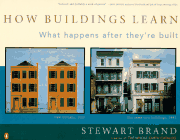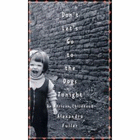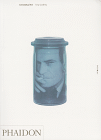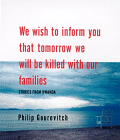Non-fiction

|
Design Like You Give A Damn - Architecture for Humanity In a humanitarian crisis, it takes more than airlifted tents and cash to rebuild a community. Architects can help by 1) treating the people like clients, not victims; 2) training community members to do the construction so they gain useful skills; 3) using local materials to save on shipping and to blend in with the surroundings; 4) build for ecological and economic sustainability; 5) not relocating people (they want to stay near their old homes). An inspiring book that showcases beautiful and ingenious ways to use architecture to save lives and bring people together. |

|
How Buildings Learn: What Happens After They're Built - Stewart Brand An argument for the study of vernacular architecture. Packed with illustrations, which often make the points more eloquently than text could. |

| Mother Tongues: Travels through Tribal Europe - Helena Drysdale The author takes a road trip through Europe exploring regions that have managed to preserve their ancient languages and cultures in the face of modernization and shifting national borders. |

| The Spirit Catches You and You Fall Down - Anne Fadiman A tragic story of cultural miscommunication between an immigrant Hmong family and the California social and medical establishments. |

| Don't let's go to the dogs tonight - Alexandra Fuller |

| Conceptual Art - Tony Godfrey A history of conceptual art. |

|
We Wish to Inform You That Tomorrow We Will be Killed With Our Families: Stories from Rwanda - Philip Gourevitch Gourevitch visited Rwanda and surrounding countries a year after nearly one millions Tutsis were killed by their Hutu neighbors. He talks to the survivors and the killers about the past and present. He also documents how our ignorance and the international community's complicity with Hutu Power prolonged Rwanda's suffering. A fantastic read. |

| Girl, Interrupted - Susanna Kaysen A memoir of a institutionalized teenage girl. She juxtaposes her account with copies of the official documents, such as her diagnosis upon entry, to show the differences between her perception of events and the institution's. |

| A Small Place - Jamaica Kincaid A tiny book describing Jamaica Kincaid's homeland, Antigua. She describes a place not apparent to the tourists: ...where the sun always shines and where the climate is deliciously hot and dry for the four to ten days you are on your holiday, since you are a tourist, the thought of what it might be like for someone who had to live day in, day out in a place that suffers constantly from drought... |

| Vegetarian Cooking for Everyone - Deborah Madison Deborah Madison was one of the founders of the renowned "Greens" vegetarian restaurant in San Francisco before moving to Santa Fe. This massive cookbook is a great reference book for vegetables and contains recipes ranging from simple to moderately complex. |

| True Tales From Another Mexico - Sam Quinones A collection of essays about Mexico and Mexicans - from the Oaxacan basketball players in LA to the drag queens of Mazatlan. |

| Making PCR : A Story of Biotechnology - Paul Rabinow PCR was not created by one person, but it was born in a culture that is explored by anthropologist Paul Rabinow. Full of interviews with the people involved in its discovery and development. |

| Home - Witold Rybczynski A well-written and very readable of the history of "home." Starts in the Middle Ages, when home was a public place and there was no concept of "comfort" or "domesticity." The book takes us through England and France, where furniture makers became celebrities, and Holland, where homes of reduced size and increased practicality developed out of necessity. It ends with a discussion of the most recent events in the evolution of the home - the loss of servants and the introduction of technology. |

|
The Man Who Mistook His Wife for a Hat - Oliver Sacks Lots of fascinating short accounts of Sacks' neurology patients, accompanied by often meditative commentaries by the author. One can learn a great deal about the workings of the mind by studying its disorders. Very readable. The first chapter, an introduction, is drier than the rest. |

| A Question of Hu - Jonathan Spence We struggle to understand Hu, the Cantonese convert of an 18th century French missionary. When he is brought to France, his actions make him appear insane, but is he just reacting in the only way he can to his strange new environment? |

|
Envisioning Information - Edward Tufte This is a beautiful work about the ways people have represented information on paper. His other work, the Visual Display of Quantitative Information, is a bit more practical for the graph maker. |

|
Mr Wilson's Cabinet of Wonder - Lawrence Weschler Based on a fascinating Harper's article on The Museum of Jurassic Technology, a kooky museum in Los Angeles where the lines between parody and homage to museums are blurred. |

|
The World's Most Dangerous Places - Robert Young Pelton Lists thirty-five countries with bad reputations, and provides vital information, like the military hotspots and who is killing whom. It also has a general section describing serious tropical diseases and what to do if you're kidnapped. The problem with this kind of information is that it changes so fast. I visited two of the cities mentioned (Phnom Penh and Diyarbakir), which were were interesting but not nearly as dangerous as the book implied. The problem with describing such volatile regions is that the players can change so quickly - I think both the Khmer Rouge and the PKK have mostly settled down since the last edition was published. I am looking forward to seeing the next edition. |
Fiction

|
The Lone Ranger and Tonto Fistfight in Heaven - Sherman Alexie A boy growing up on a Spokane Indian Reservation in Washington State surrounded by alcoholism and identity conflicts. Reminded me of Donald Duk in its mix of contemporary problems and inspiration from traditional tales. This work is not classified as a novel because the individual tales, which share the same characters and events, do not form a continuous narrative. They can stand alone as stories, and if you ever get the chance to see Sherman Alexie speak in person, you will probably be treated to a great retelling (or monologuing, as he calls it) of one of these shorts. |

|
Invisible Cities - Italo Calvino Beautiful prose poems of imaginary cities. Written as a dialog between "Kublai Khan" and "Marco Polo." |

| Donald Duk - Frank Chin Lively and vivid story of a Chinese-American boy with a name and culture he hates. Many references to the Outlaws of Longshan Marsh (a Chinese folk tale) and the Chinese Americans who built the railroads in the 1800's. The author prides himself on historical and cultural accuracy and berates Amy Tan for not doing the same. |

| A heartbreaking work of staggering genius - Dave Eggers An autobiography with a little creative license, this book recounts the life of Dave, in his early 20's, and his guardianship of his pre-teen brother Toph after the sudden death of both of their parents. It manages to maintain an ironic tone from the copyright notice (really) to the last page, to surprisingly good effect - it makes the humorous parts sharper and the tragic parts are more poignant. People who enjoy McSweeney's web page or print magazine (Eggers is the editor) will certainly want to read this book. |

| The Beach - Alex Garland Ko Sanh Road backpackers' version of "Lord of the Flies". Not great literature, but has insights into the backpacker subculture. |

| The Bone People - Keri Hulme Wonderful work about a Maori woman, a white man, and his son with themes of love, abuse, and redemption. Winner of the Pegasus Prize. |

|
The Cyberiad - Stanislaw Lem Light, intelligent fables of two inventors and their cybernetic adventures. Imagine fairy tales for robots. |

|
All the Pretty Horses - Cormac McCarthy Beautiful, lean prose describing a teenage boy's journey from his home in Texas to Mexico and back. This is a coming-of-age novel, but the gorgeous evocations of the lonely Mexican landscape often take precedence over the protagonist's actions. McCarthy's style has been compared to Faulkner's and has long been praised by the literary community. He never had a large following until the publication of this novel, his sixth or seventh. All the Pretty Horses was the winner of the National Book Award, which the reclusive author never bothered to pick up. |

|
Rosencrantz and Guildenstern Are Dead - Tom Stoppard So what did Rosencrantz and Guildenstren do when they weren't talking to Hamlet? Apparently having wacky ruminations on the history of science and philosophy among other things. |

|
Cat's Cradle - Kurt Vonnegut Really bizarre sci-fi story by a man who always brings his unorthodox social views to his works. Deals with the power and the responsibility of science, and the unforgettable religion of "Bokononism." |

|
Kitchen - Banana Yoshimoto A very quirky novel. The young author seems to be obsessed by incest and alternate sexualities, but these topics are presented in a light manner that grants them a kind of normality. Both Kitchen, her first novel, and NP are great fun to read. |
My to do list:
Biology: The Scientific Literature: A Guided Tour edited by Joseph E. Harmon and Alan G. Gross The origins of genome architecture - Michael Lynch The "God" Part of the Brain by Matthew Alper Leading Geeks Lab Dynamics Scientist's guide to talking with the media Laboratory Life by Bruno Latour The Ecological Detective by Ray Hilborn, Marc Mangel The mathematical theory of infectious diseases and its applications - Bailey, T. J. Infectious diseases of humans : dynamics and control - Roy M. Anderson and Robert M. May Acquiring Genomes: A Theory of the Origins of Species - Lynn Margulis, Dorion Sagan, Ernst Mayr MHC Ligands and Peptide Motifs - H. G. Rammensee, J. Bachmann, and S. Stevanovic Renshaw, E. (1991) Modelling Biological Populations in Space and Time. Liaisons of Life: From Hornworts to Hippos, How the Unassuming Microbe has Driven Evolution - Tom Wakeford Dr. Folkman's War: Angiogenesis and the Struggle to Defeat Cancer - Robert Cooke, C. Everett Koop --- Art & Music: Data Flow: Visualizing Information in Graphic Design The Endless City - Ricky Burdett, Deyan Sudjic Nicholas Kahn & Richard Selesnick: The Apollo Prophecies The Art of Innovation : Lessons in Creativity from Ideo, America's Leading Design Firm by Tom Kelley Theorizing a new agenda for architecture - Kate Nesbitt Funk : The Music, the People, and the Rhythm of the One by Rickey Vincent Homemade esthetics - Clement Greenberg Logic and Design : In Art, Science & Mathematics - Krome Barratt Design Culture Now: The National Design Triennial - Donald Albrecht, Ellen Lupton, Steven Skov Holt Shock of the New - Robert Hughes Wordless Diagrams - Nigel Holmes --- Non-fiction: Visualizing Data - Ben Fry Maps of the Imagination: The Writer as Cartographer - Peter Turchi The Enlightened Bracketologist: The Final Four of Everything Else/where: Mapping - New cartographies of networks and territories Spook: Science Tackles the Afterlife - Mary Roach The World's Worst: A Guide To The Most Disgusting Hideous; Inept, And Dangerous People, Places, And Things On Earth by Mark Frauenfelder Critical Mass - Phillip Ball The Careful Writer - Theodore Bernstein Things a Computer Scientist Rarely Talks About (Csli Lecture Notes, No. 136) - Donald Ervin Knuth Persian Mirrors: The Elusive Face of Iran - Elaine Sciolino Florence : A Delicate Case (Writer and the City, 3) - David Leavitt Under the Tuscan Sun - Mayes Oaxaca Journal - Oliver Sacks To Destroy You Is No Loss : The Odyssey of a Cambodian Family - JoAn Dewey Criddle Soul of a Chef: The Journey Towards Perfection - Michael Ruhlman Pépin, Jacques - La technique Feeding a Yen: Savoring Local Specialties from Kansas City to Cuzco - Calvin Trillin The Man Who Ate Everything - Steingarten The Social Life of Information by John Seely Brown, Paul Duguid Readings in Information Visualization : Using Vision to Think - Stuart K. Card Accidental Asian Shah of Shahs Witold Rybczynski Weschler - A Wanderer in the Perfect City The Social Construction of What? - Ian Hacking Everything and More - Wallace --- Fiction: The World To Come - Dara Horn Bloodletting and Miraculous Cures - Vincent Lam The Child Garden - Geoff Ryman Love after war James Hynes When the emperor was divine - Julie Otsuka Paperback Original - Will Rhode Mario Benedetti The Potato Factory - Bruce Courtenay My Century - Gunter Grass Memoirs of a Geisha The Barbarians are coming - David Wong Louie Astrological Diary of God - Bo Fowler White Teeth - Zadie Smith Plainsong - Kent Haruf Anna Deveare Smith Wild Swans - Jung Chang Flatterland - Ian Stewart Richard Flanagan Tim O'Brien Liar's Poker Katherine Dunn Edwidge Danticat